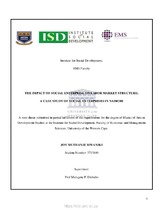The impact of social enterprise on labor market structure: A case study of social enterprises in Nairobi
Abstract
Social entrepreneurship has spread worldwide, as social entrepreneurs seek the solutions to
developmental challenges. This is especially true in Nairobi, Kenya, as social entrepreneurship
has established itself in the labor market. However, there is limited knowledge regarding the
impact of social enterprises in African countries, especially with regards to the labor market. It
is for this reason that this study aims at highlighting the impact of social enterprises on the
labor market in Nairobi, Kenya. It also provides an outline of the labor market structure in
Nairobi.
The study employed a mixed methods approach, using both qualitative and quantitative
approaches, collected concurrently as part of a concurrent triangulation design. Five social
enterprises located in Nairobi were involved in the study, and were chosen through snowball
sampling. These social enterprises offered direct employment, training programmes or support
for beneficiaries to start their own businesses. The research instruments used in this study were
as follows; 10 interviews (5 interviews with beneficiaries and 5 with social entrepreneurs), 50
questionnaires distributed to beneficiaries through random sampling, field work observations
and a literature review.
The results of this study were that social enterprises in Nairobi have a significant impact on the
livelihoods of beneficiaries by directly employing them, providing necessary skills for later
employment or supporting them to start their own businesses. However, these increases in
income are often either inadequate or inconsistent as most beneficiaries are forced to diversify
their livelihoods. Social enterprises also fail to reduce the gender wage gap among their
beneficiaries.
Social enterprises also increase market access among their beneficiaries by providing them
with advice and training, as well as, direct access to customers. In the same vein, they increase
the level of training of beneficiaries. This helps beneficiaries improve their relations with
customers, produce high quality goods, hone their skills, gain employment, gain experience,
build a repertoire, earn profits and start businesses. The subject of training also affects the
income levels of beneficiaries, as many of those who study entrepreneurship, quality training
and customer service earn above minimum wage.
Additionally, social enterprises impact formalization among their beneficiaries. However, once
beneficiaries leave, they often return to the informal sector. Therefore, the impact on formalization is only significant while beneficiaries are participating in the social enterprise.
Social enterprises also influence the attitudes of beneficiaries, creating a more positive outlook
on their contribution to the labor market. Likewise, social enterprises shift perceptions about
formal qualifications as beneficiaries feel that they can still secure employment by showing
their level of experience or body of work.
Lastly, social enterprises have limited impact on fair trade ideals as majority of the social
enterprises in Nairobi are not knowledgeable about fair trade, and therefore do not aim towards
it. For those that do adopt the fair trade model, it is unclear if they have influenced their
beneficiaries to actually believe in these ideals or just simply require them to comply with fair
trade regulations.
In conclusion, the study determined that social enterprises do have significant impact in the
labor market structure, increasing livelihoods, improving educational qualifications, and
influencing formalization and attitudinal structures in Nairobi. However, social enterprises
must also focus on improving their impact with regards to strengthening livelihoods, especially
among their female beneficiaries and creating permanent change in formalization among their
beneficiaries even after they leave the enterprise. Likewise, social enterprises should consider
the importance of fair trade ideals in their daily practice, and the value of imparting these to
their beneficiaries.

